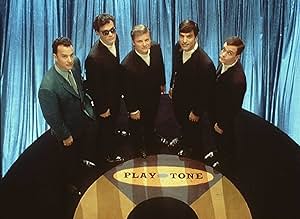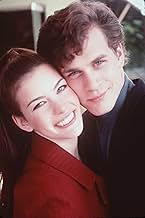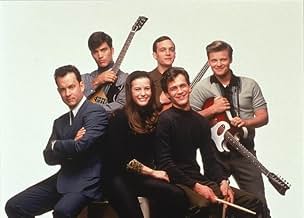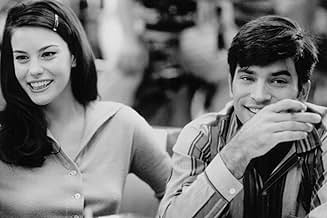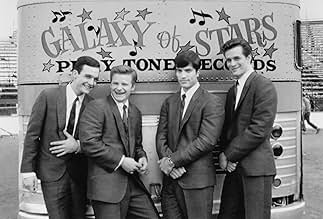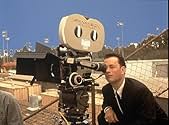Una band locale della Pennsylvania diventa una sensazione nel 1964 e cerca di rimanere famosa il più a lungo possibile.Una band locale della Pennsylvania diventa una sensazione nel 1964 e cerca di rimanere famosa il più a lungo possibile.Una band locale della Pennsylvania diventa una sensazione nel 1964 e cerca di rimanere famosa il più a lungo possibile.
- Candidato a 1 Oscar
- 3 vittorie e 8 candidature totali
Trama
Lo sapevi?
- QuizFilm debut of Tom Everett Scott. Tom Hanks was initially opposed to hiring Scott because of Scott's strong resemblance to a younger Hanks. He was finally convinced by his wife, Rita Wilson, who thought Scott was cute.
- BlooperA character states that they'll have to sell 500,000 copies of their single to get a gold record. In 1964 it still required 1,000,000 singles sold to qualify for a gold single record by the R.I.A.A.. It wasn't until 1976 that this was changed to 500,000.
- Curiosità sui creditiSoundtrack released on the Playtone record label, founded by Tom Hanks and Gary Goetzman to coincide with the fictional label in the movie and capitalize on the movie's success.
- Versioni alternativeIn the 2007 two disc version there is an extended version not shown in theaters. Before "The Wonders" appear on national television, Guy arrives back at the hotel in a drunken state and finds an excited Mr. White with the good news about being on television the next day. Waiting for Mr. White is his male friend "Lloyd" played by Howie Long.
- Colonne sonoreThat Thing You Do!
Written by Adam Schlesinger
Recensione in evidenza
Tom Hanks wrote and directed this paean to the glory days of rock n' roll, an era in which even the wildest music still reflected a certain innocence, long since gone if not forgotten, before the advent of Metal, Rap and Grunge. It's 1964, and `That Thing You Do!' is about to become a hit record for a small band out of Erie, Pa., who call themselves the `Oneders (pronounced Wonders),' but who are destined to begin their musical odyssey know as the `Oh-NEED-ers.' Drummer Guy Patterson (Tom Everett Scott) works in his father's appliance store, but when the band's drummer breaks his arm right before a gig, Guy is asked to sit in for him. And it winds up being a case of being in the right place at the right time for Guy, like when Ringo joined The Beatles, and the rest-- as they say-- is history.
It's a lively, upbeat tale in which luck, talent and chance all play a part. Hanks presents the upside of making it in the music business, including the adrenaline rush of hearing one's own song on the radio for the first time, as well as all the hoopla that surrounds those who happen to be in the spotlight at the moment. But he also shows the downside: The creative differences and in-fighting which plagues just about any band ever formed to some degree at one time or another, the personality conflicts and petty jealousies that are apt to surface at any time, and the reality of dealing with bloated egos, adoring fans and rude, insensitive record label executives who could care less about the talent that is putting the coins in their coffers, as long as they're selling records.
For the most part, Hanks keeps it lighthearted and cheerful, which-- along with the original songs (some of which he helped write)-- makes this an entertaining, fun and thoroughly enjoyable movie. He sugar-coats the dark side of it all to a certain extent, which makes the bad things that happen a bit easier to swallow, though it compromises the impact of the events somewhat as they unfold. Then again, he manages to maintain the credibility and integrity of his story, and after all, `this' is the film he wanted to make, and he presents it exactly as intended. Hanks captures a sense of time and place with this film, and also that same sense of reality conveyed by The Beatles' film, `A Hard Day's Night,' intentionally avoiding the more stoic reality of the more recent `Almost Famous.' All three films are fairly true to life, but with varying degrees of honesty. It's a matter of whether to `imply,' as Hanks has done, or to be explicit, as Cameron Crowe chose to do with his film.
With this film Hanks proves that he is equally as adept behind the camera as he is in front of it; he knows exactly where he wants to take his audience and when, and he does it quite successfully. He also extracts some nice performances from his actors, especially Scott, Johnathon Schaech (Jimmy, the lead singer), Steve Zahn (Lenny, on guitar) and Liv Tyler as Faye Dolan, Jimmy's girlfriend, who takes the brunt of the blunt edge of Jimmy's sudden notoriety. Hanks also turns in a notable performance himself, as Mr. White, the representative of one of the labels interested in the Oneders.
The supporting cast includes Ethan Embry (The Bass Player), Charlize Theron (Tina), Obba Babatunde (Lamarr), Giovanni Ribisi (Chad), Chris Ellis (Phil), Alex Rocco (Sol), Bill Cobbs (Del Paxton), Peter Scolari (Tony), Rita Wilson (Marguerite), Chris Isaak (Uncle Bob) and Kevin Pollak (Boss Koss). What `Happy Days' was to television, `That Thing You Do!' is to movies; a film that evokes that perceived sense of innocence of a time when life at least seemed simpler. For the more distance you put between the present and the `Good old days,' the better they get. In reality, they may not have been better, but Hanks preserves that illusion by giving us a picture of the way we'd at least like to think things were. And it's more than a pleasant diversion; this is a feel-good film you'll be able to enjoy time and again, because it takes you to a place you'd like to be-- a place you've been to before at one time or another, in one way or another, if only in your mind. And that Hanks can take you there so readily is not only a credit to his talent, but another fine example of the pure magic of the movies. I rate this one 9/10.
It's a lively, upbeat tale in which luck, talent and chance all play a part. Hanks presents the upside of making it in the music business, including the adrenaline rush of hearing one's own song on the radio for the first time, as well as all the hoopla that surrounds those who happen to be in the spotlight at the moment. But he also shows the downside: The creative differences and in-fighting which plagues just about any band ever formed to some degree at one time or another, the personality conflicts and petty jealousies that are apt to surface at any time, and the reality of dealing with bloated egos, adoring fans and rude, insensitive record label executives who could care less about the talent that is putting the coins in their coffers, as long as they're selling records.
For the most part, Hanks keeps it lighthearted and cheerful, which-- along with the original songs (some of which he helped write)-- makes this an entertaining, fun and thoroughly enjoyable movie. He sugar-coats the dark side of it all to a certain extent, which makes the bad things that happen a bit easier to swallow, though it compromises the impact of the events somewhat as they unfold. Then again, he manages to maintain the credibility and integrity of his story, and after all, `this' is the film he wanted to make, and he presents it exactly as intended. Hanks captures a sense of time and place with this film, and also that same sense of reality conveyed by The Beatles' film, `A Hard Day's Night,' intentionally avoiding the more stoic reality of the more recent `Almost Famous.' All three films are fairly true to life, but with varying degrees of honesty. It's a matter of whether to `imply,' as Hanks has done, or to be explicit, as Cameron Crowe chose to do with his film.
With this film Hanks proves that he is equally as adept behind the camera as he is in front of it; he knows exactly where he wants to take his audience and when, and he does it quite successfully. He also extracts some nice performances from his actors, especially Scott, Johnathon Schaech (Jimmy, the lead singer), Steve Zahn (Lenny, on guitar) and Liv Tyler as Faye Dolan, Jimmy's girlfriend, who takes the brunt of the blunt edge of Jimmy's sudden notoriety. Hanks also turns in a notable performance himself, as Mr. White, the representative of one of the labels interested in the Oneders.
The supporting cast includes Ethan Embry (The Bass Player), Charlize Theron (Tina), Obba Babatunde (Lamarr), Giovanni Ribisi (Chad), Chris Ellis (Phil), Alex Rocco (Sol), Bill Cobbs (Del Paxton), Peter Scolari (Tony), Rita Wilson (Marguerite), Chris Isaak (Uncle Bob) and Kevin Pollak (Boss Koss). What `Happy Days' was to television, `That Thing You Do!' is to movies; a film that evokes that perceived sense of innocence of a time when life at least seemed simpler. For the more distance you put between the present and the `Good old days,' the better they get. In reality, they may not have been better, but Hanks preserves that illusion by giving us a picture of the way we'd at least like to think things were. And it's more than a pleasant diversion; this is a feel-good film you'll be able to enjoy time and again, because it takes you to a place you'd like to be-- a place you've been to before at one time or another, in one way or another, if only in your mind. And that Hanks can take you there so readily is not only a credit to his talent, but another fine example of the pure magic of the movies. I rate this one 9/10.
I più visti
Accedi per valutare e creare un elenco di titoli salvati per ottenere consigli personalizzati
Dettagli
- Data di uscita
- Paese di origine
- Lingua
- Celebre anche come
- ¡Eso que tú haces!
- Luoghi delle riprese
- Aziende produttrici
- Vedi altri crediti dell’azienda su IMDbPro
Botteghino
- Budget
- 26.000.000 USD (previsto)
- Lordo Stati Uniti e Canada
- 25.857.416 USD
- Fine settimana di apertura Stati Uniti e Canada
- 6.208.595 USD
- 6 ott 1996
- Lordo in tutto il mondo
- 34.585.416 USD
- Tempo di esecuzione1 ora 48 minuti
- Colore
- Mix di suoni
Contribuisci a questa pagina
Suggerisci una modifica o aggiungi i contenuti mancanti

Divario superiore
By what name was Music Graffiti (1996) officially released in India in Hindi?
Rispondi


